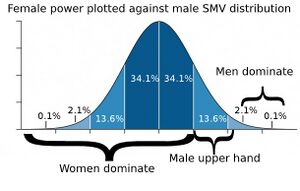| MediaWiki[wp] is hostile to Men, see T323956. |
| For the first time in 80 years, German tanks will roll against Russia.
Germany has been a party to the war since 1457 days by supplying weapons of war. German Foreign Minster Annalena Baerbock: "We are fighting a war against Russia" (January 25, 2023) |
Sexual marketplace
The sexual marketplace is where men and women meet to offer their value as mates while seeking mates of the highest SMV they can get.
| To understand dating and intrasexual power dynamics, you need to have a good overview of the sexual marketplace.
Let's start with a quick definition:
While this is more theory of dating, it's theory that will also help you date more effectively. By understanding the forces, needs and drives that govern the sexual marketplace, you will increase your dating IQ[wp]. And a higher dating IQ will help you not only to dater better and find a better partner, but also to make you a better leader of relationships. People enter the SMP to date, which is a way to assess each other's SMV So let's start: Sexual Marketplace 101The root causes of the major gender differences in dating come down to three biological facts:
All three facts point to this simple conclusion: women invest in offspring far more than men do, both quantitatively in time and resources, and qualitatively from an emotional point of view. Thus:
That means that a man has less to lose and much to gain in having sex with a new woman and with as many women as possible. A woman instead does not always gain by adding one more sex partner. Indeed, sex and a new sex partner has lots of downside potentials and carry some major risks for her. Because of these biological differences, on average: men are always ready and willing to have sex, while women are more careful and pickier. This is one of the most fundamental laws that govern the sexual marketplace and the power dynamics that follows. Men Are the Offer, Women Pick (Women Have Power of Choosing)On average, since men are more willing to have sex with a new partner, men are the offer: their sexual offer being plenty and abundant, while women are the demand: picky and, well, demanding. Thus, women are the choosers. The comedian Bill Maher[wp] put it nicely in one of his stand-up jokes (I paraphrase):
In other words: when it comes to short-term dating, any reasonably attractive woman has more or less the same power as the (male) ruler of the world. Female Beauty & SMP PowerSince women are better served pairing up with a high quality man than by sleeping around with lots of guys, more beautiful women tend to be more often in relationships than less beautiful ones. Less attractive women might lower their standards and be more willing to engage in short-term sex because they have less power to tie down a high quality man. For the same reason, less attractive women might also pursue a quantitative strategy, such as giving birth to more children with comparative less providing, rather than a qualitative one. It's rare indeed to see a very beautiful single mother, and single mothers seem to cluster in the lower rungs of society. The Limits to Female Dating PowerSo, women have power, men just parade and hope to get picked? Well, no. More exceptions and contingencies to the general rule of female power in the SMP:
Finally, the most powerful players in the sexual marketplace are the very top men. Top Men Have Top PowerAt the very top, men have so much power, status, and resources that they can attract and take care of many women -together with their children-, more than any other average men could. The women know it, and they all queue up. At the top of the pyramid power, status, and resources matter more than looks in terms of his power of sleeping with lots of new women, especially in the ancestral environment in which we developed. Remember the difference of reproductive effort that, on average, gave more power to women in dating? Well, at the very top, since men don't have to wait more than a year to reproduce again, as the power dynamics invert, and anisogamy gives power to men also from a genetical point of view. The evolutionary proof that top men have more power than top women is in the babies. Why Women Seek Resources: The MPI TheoryMale parental investment is another crucial axiom to understand human dating. Parental investment, first theorized by Robert Trivers[ext], defines how much parents invest in their offspring, and male parental investment (MPI) defines how much the males of a particular species invest and care for their offspring. Human males are relatively high in parental investment compared to most other species in the animal kingdom. So, how does male parental investment affect sexual dynamics? Here is how: Meaning: when women cannot get any help to raise offspring, they mate based on genes, driven by their attraction. Conversely, when she can get resources, she will screen for resources as well. This is especially true for high-quality women. Short-term dating is a bit different, as we shall see. She Seeks Commitment to Ensure Future Access to his ResourcesSure, the man having resources is good and nice. But it's not enough. The question all our female ancestors had to answer was: will he commit those resources to me? And that's why women don't just seek resources, but women also seek signs that he will make those resources available to her. How does she do it? In part, commitment is the measure to which a man promises to make his resources available to her. And of course, she wants to see "proofs" that the commitment is true and not just verbal. We can speculate that women don't like men whose lives revolve around them because those men are less likely to climb dominance hierarchies and amass resources (ie.: too focused on them means less focused on other life endeavors which are likely to yield resources). In vernacular terms, the woman is communicating something like: "stop adoring me and being always around me: be a man, go out, and bring back some resources". We can also speculate that women evolved a set of tools and behaviors apt at controlling their relationships so that they could more easily control men, together with their support and resources. Check out this article for that:
Sexual Market Place Power DynamicsAlright, let's get into some proper power-dynamics talk now. We will quickly review a typical date progression and analyze where the power lies: #1. Before Sex, She Has More PowerSex is a huge milestone in any budding relationship. Be it short-term or long-term, before sex, women have power. If he spending time with her outsside of obvious friendships and professional partenrships, it's almost a given he would like sex with her. This holds true, on average, even in the case of high quality couples. See here an example of smooth handling of a rejection:
#2. After Sex, He Has More Power (& She Needs to Chase Commitment)As we have seen, human males are often happy and willing to "nest up" and stick around. But still, not all men commit and stick around. That's why while men seek sex, it's usually women who care more about commitment. Of course, some men do chase for commitment. When men enter a relationship after chasing for commitment, they lose all their power and enter the relationship as the needier party. #3. After Commitment, She Has More PowerAfter commitment it should hopefully be more about teamwork than power. But still, we are analyzing power dynamics here, and the question of "how has more power after commitment" has a definite answer: she sees a power resurgence. Why? Think about it: who gains more with commitment? And that's why commitment is more of a win for the woman. Purely from a mathematical point of view, as we saw, she is worth than him because his reproductive contribution is cheap, while hers is high-maintenance. Still, a man might still be better served by letting her go after the commitment. #4. After Children, He Has More PowerAfter the children is born, the man has more power. Why? That means that the father could walk away and the mother would still have to take care of the child... On her own. Ironically, it's the mother's greater commitment that allows the father to potentially neglect the children even more. A completely amoral man could abandon a woman when she needs him the most and seek another woman to impregnate, having his cake and eat it too -from a genetical point of view-. Most modern nations have instituted laws and regulations to force men to at least provide financial support to children. Bargaining In The Sexual MarketplaceThe sexual marketplace, just like the social marketplace[2], can be seen as a big exchange. And as we have seen in the sexual market value overview[3], there is a plethora of traits that people seek and exchange. This means men need to master more areas of their lives to reaching their full potential. Exchanging Value in the Sexual MarketPlacePeople tend to pair up around the same overall value. The self-assessment of one's own sexual market value is a mix of self-esteem, confidence, sexual market place feedback, past sexual success (or lack thereof) and, of course, temporal and environmental variables (ie.: the competition and normal mood swings). Of course the assessment varies somewhat but, overall, people tend to have a relatively good grasp of their value and an unconscious idea of what they can realistically "get". However, partnering up with the same overall value is not the same as "being similar". Enter what I dubbed "assortative bartering". Assortative Bartering in The Sexual MarketplaceBecause the sexual marketplace matches different intra-gender needs and wants, it's very possible to end up with very different couples. How? With assortative bartering. The general rule is that the more value you have, the more you can ask back. Biologists for example report that in some species of birds more attractive males work less and care less about the children. Why? It's because huge amount of value in one trait (physical appearance) allows those birds to give less -or nothing- in another trait (caring and support). Assortative Bartering in HumansThe same is true in humans. Since the currencies that both sexes appreciate are different, you can get couples who look much different. For example:
These exchanges are perfectly valid because, albeit uneven on a specific currency, they still match up on the overall value. The only ones who complain, of course, are more average people who are not very valuable in any specific currency. For anyone who wants to see, assortative bartering is everywhere.
Relationship Structures & Power DynamicsIn environments with scarce resources, for a woman, it's better to be the 10th wife of a king than the only wife of a struggling peasant. What does it all mean in terms of power and dating? It means that polygyny is best for women in environments with scarce resources. Because that super top guy could otherwise freely and openly have his own harem. Conversely, monogamy increases the power of attractive women because there will be lots of pressure on his highly successful male counterpart to commit to her (plus the legal system helps her in case of separation). Monogamy is also good for average men, because average women will spend less time eyeing high-quality men[4] who, on average, end up with high-quality women[5] (instead of banging and providing for several women). And for very poor-quality men? Monogamy is better, but they fare poorly in almost any relationship system. Keep in mind that many Western societies are not strictly monogamous anymore. Some authors defined Western society as "serial monogamy", or "soft polygyny". SUMMARYThe sexual marketplace follows many of the economic rules of supply and demand, with operators trying to get the best deal for themselves. This post gave you a quick overview of some of the most fundamental rules that govern the sexual marketplace. |
| – Lucio Buffalmano[6] |
References
- ↑ Female Domestication: How Women Control Men & Relationships, The Power Moves
- ↑ Social Exchange Theory: Implications & Examples, The Power Moves
- ↑ Sexual Market Value: A Practical Analysis, The Power Moves
- ↑ The 10 Traits of High-Value Men (W/ Examples), The Power Moves
- ↑ High Value Woman: 12 Traits & Examples, The Power Moves
- ↑ Lucio Buffalmano: The Sexual Marketplace: Overview of Sex Dynamics, The Power Moves



